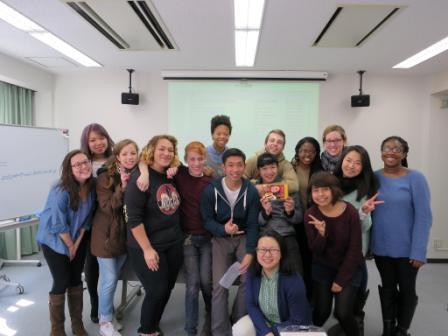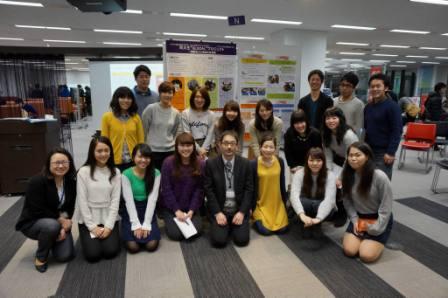Teaching
Tohoku University Graduate School of Information Sciences (April 2019 - Present) HP
- Study of Civil Society
- Community and Society
- Syllabus in Japanese
- Methods of Sociological Fieldwork
- Practice of Sociological Fieldwork
Tohoku University General Education for Undergraduates (April 2019 - Present) HP
- Sociology (Sociology of Volunteering, Nonprofits, and NGOs)
- We often hear news about "volunteers," "nonprofit organizations (NPOs)," and "non-governmental organizations (NGOs)." What is the significance of these voluntary actions in our society? This course will take a sociological perspective to analyze these actions from our own experience, examples around us, as well as relevant theories.
- Structure of the Society: Sociology of Volunteering, Nonprofits, and NGOs
- Sociology: Civil Society in the Contemporary World
The Open University of Japan (December 2021 - Present)
- NPOs and NGOs in the Contemporary Society (Face-to-Face Course)
- We often hear news about "volunteers," "nonprofit organizations (NPOs)," and "non-governmental organizations (NGOs)." What is the significance of these voluntary actions in our society? This course will take a sociological perspective to analyze these actions from our own experience, examples around us, as well as relevant theories.
Kanazawa University, Institute of Liberal Arts and Sciences (April 2016 to March 2019)HP
- International Society and Volunteers (Taught in Japanese and English)
- A liberal arts course for undergraduate students. With its foundation on volunteer spirit, non-governmental organizations (NGOs) play wide range of roles in dealing with global issues such as poverty, conflicts, and disasters. This course will explore these different roles of NGOs, analyze their uniqueness, and examine the challenges they face. This course is affiliated with “Group 4: Connect with the World” of Kanazawa University “Global” Standard.
Syllabus
Doshisha University, Faculty of Policy Studies (April 2013 to February 2016)
- Policies on International Cooperation (Taught in English)
- Policies on international cooperation depend on how engaged actors understand "development" - what they see as primary causes of the problem, how they decide on desirable goals, and what they judge as the most effective and efficient ways to intervene. This class will review development theories and analyze policies of key actors including government agencies, international organizations, and NGOs (non-governmental organizations).
Syllabus
As a mid-term project, students enrolled in this class in Spring 2015 developed a proposal of Post Millennium Development Goals (MDGs).
Proposal for Post-2015 Development Goals - Policy Topics: International Cooperation and NGOs (Taught in Japanese)
- Academic Skills in Communication: International Communication Skills (Taught in English/Japanese)
- Academic Skills in Communication: Learning Policy Communication from Social Marketing (Taught in Japanese)
- Academic Skills in Reading: Why Engage in International Cooperation and International Development ? (Taught in English)
- First Year Experience (Taught in Japanese)
- Project-Based Seminar: Going "GLOCAL" in Doshisha : Developing an Action Plan for GLOCAL Community (Taught in Japanese)
Kyoto Consortium for Japanese Studies (January 2015 to April 2016)
- Civil Society and Voluntary Actions in Japan
- The significance of civil society and voluntary sector in Japan has never been greater than today. Organizations like nonprofits and neighborhood associations are now considered as one of the key actors in solving urgent social issues (for example, rising need of elderly care that emerge from ever-aging society, efforts to prepare for natural disasters that strike Japan frequently, and revitalizing rural communities). This course will explore the roles these civil society organizations play in Japan today, as well as challenges that they face. The class will also examine whether civil society and voluntary sector in Japan is unique in comparison to other societies in its culture of giving, volunteering, and advocacy.
Syllabus - Dealing with Disasters in Japan
- Japan is one of the countries around the world where natural disasters occur quite frequently. A small island nation located on the Pacific Rim, earthquakes, tsunamis, and volcano eruptions are serious everyday threats to those living in Japan. In fact, Japan was a home to 18.5 percent of the world’s earthquakes larger than magnitude 6.0 between 1984 and 2013. Some of the devastating disasters in the recent years include: a magnitude 7.3 earthquake in Kobe in 1995 (known as the Great Hanshin-Awaji Earthquake), a magnitude 6.8 earthquake in Niigata (Niigata-Ken-Chuetsu Earthquake) in 2004, and a magnitude 9.0 earthquake and tsunami that struck Northeastern Japan on March 11, 2011. From these experiences, Japan has developed policies, frameworks, and practices to prepare and respond to disasters. In action are the government - both national and local - as well as businesses and civil society organizations including nonprofits and NGOs. In this course, we will examine how the Japanese society has dealt with these risks of disasters. How do these actors prepare, respond, and recover from catastrophes? What were the lessons learned from the past experience, and what measures are being taken? How is Japan contributing to disaster management globally? The class will read studies and researches accumulated in the field of disaster management to examine how the Japanese society deals with disasters from historical, social, political, and economic perspectives.
Tentative Syllabus


